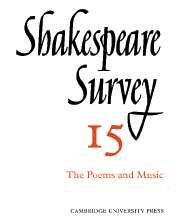Book contents
- Frontmatter
- Twentieth-century Studies in Shakespeare's Songs, Sonnets, and Poems
- Songs, Time, and the Rejection of Falstaff
- Shakespeare’s Sonnets and the Elizabethan Sonneteers
- Love’s Confined Doom
- Beasts and Gods: Greene’s Groats-worth of Witte and the Social Purpose of Venus and Adonis
- From Shakespeare’s Venus to Cleopatra’s Cupids
- Venus and the Second Chance
- Some Observations on The Rape of Lucrece
- An Anatomy of The Phoenix and The Turtle
- Shakespeare and the Ritualists
- Illustrations of Social Life IV: The Plague
- The Soest Portrait of Shakespeare
- International Notes
- Shakespeare Productions in the United Kingdom: 1960
- S. Franco zeffirelli’s Romeo and Juliet
- The Year's Contributions to Shakespearian Study 1 Critical Studies
- 2 Shakespeare’s Life, Times and Stage
- 3 Textual Studies
- Book Received
- Index
- Plate Section
Shakespeare’s Sonnets and the Elizabethan Sonneteers
Published online by Cambridge University Press: 28 March 2007
- Frontmatter
- Twentieth-century Studies in Shakespeare's Songs, Sonnets, and Poems
- Songs, Time, and the Rejection of Falstaff
- Shakespeare’s Sonnets and the Elizabethan Sonneteers
- Love’s Confined Doom
- Beasts and Gods: Greene’s Groats-worth of Witte and the Social Purpose of Venus and Adonis
- From Shakespeare’s Venus to Cleopatra’s Cupids
- Venus and the Second Chance
- Some Observations on The Rape of Lucrece
- An Anatomy of The Phoenix and The Turtle
- Shakespeare and the Ritualists
- Illustrations of Social Life IV: The Plague
- The Soest Portrait of Shakespeare
- International Notes
- Shakespeare Productions in the United Kingdom: 1960
- S. Franco zeffirelli’s Romeo and Juliet
- The Year's Contributions to Shakespearian Study 1 Critical Studies
- 2 Shakespeare’s Life, Times and Stage
- 3 Textual Studies
- Book Received
- Index
- Plate Section
Summary
In a sonnet addressed to Spenser, Keats remarks,
The flower must drink the nature of the soil,
Before it can put forth its blossoming.
This describes very well Shakespeare’s relationship to his fellow-sonneteers. However different the blossom he produced, their work, their example, provided the soil from which it sprang. The relationship is a complex one, and I wish to examine only one aspect of it here, namely Shakespeare’s attitude to the accepted ‘poetic’ of the sonnet-sequence, in the hope that this may throw light upon the way in which the tradition has been adapted to suit an individual talent.
Convention is so much the ruling power in the Renaissance sonnet-sequence that even the principles and assumptions upon which the sonneteer claims to be writing are themselves a part of the convention. Thus the 'poetic' which I am about to outline is in its context what we might call the governing conceit, consistent and true only within its own largely artificial limits. The sonneteer for the most part wears a double mask—as poet, no less than as lover.
- Type
- Chapter
- Information
- Shakespeare Survey , pp. 41 - 49Publisher: Cambridge University PressPrint publication year: 1962



